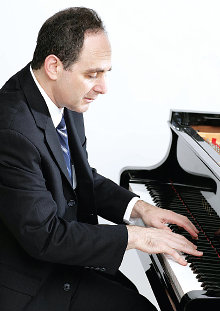Richard Kogan Explores the Mind of Ragtime King Scott Joplin
Abstract
In his ongoing series of lectures discussing great composers, Richard Kogan, M.D., will explore how suffering influenced and ultimately healed one of America’s early talents.
For many, Scott Joplin (1867/1868–1917) might simply be remembered as one of the pioneers of ragtime—a classically-derived musical form characterized by strong syncopated rhythms.

But the story of Joplin, and of ragtime, represents much more to Richard Kogan, M.D., a clinical professor of psychiatry at Weill Cornell Medical College, artistic director of the Weill Cornell Music and Medicine Program, and co-director of the Weill Cornell Human Sexuality Program.
For him, and others, Joplin and his piano pieces showcase the role of suffering as a creative muse, the importance of overcoming racial tensions, and the potential healing power of music.
“When you listen to classic ragtime pieces and note the basic tension between the metrically rigid baselines and the captivating, sycnopated melodic lines, you can almost hear it as the struggle and eventual triumph of freedom over slavery,” he told Psychiatric News, noting that ragtime was created by the first generation of freeborn African Americans in the years following the Civil War.
Kogan, an award-winning pianist who studied at the Juilliard School, will discuss all of these influences during a special session at APA’s 2016 Annual Meeting titled “The Mind and the Music of Scott Joplin.”
Regular attendees of the APA Annual Meeting will know that this is not the first “Music and Mind” lecture from Kogan, who for several years has been providing insights about the link between psychiatric illness and creativity in some of history’s most famous composers.
With this year’s lecture, though, Kogan aims to go beyond the level of individual mental illness (though it could apply as Joplin developed dementia due to syphilis and died in a state psychiatric institution) and take a broader look at how great music arose from—and alleviated—emotional turmoil, using Joplin as a focal character.
And Atlanta will be a fitting location, not only because it is the site of the National Center for Civil and Human Rights, but it is also the city that premiered Joplin’s magnum opus, the opera “Treemonisha,” in 1972. (Joplin was never able to stage a complete performance of his work during his lifetime.)
“What makes this work especially poignant is that Joplin wrote the lyrics and music for the opera, and it’s seen as quite autobiographical,” said Kogan. “He left so little written information about himself that many of the best clues into Joplin’s life come from ‘Treemonisha.’ ”
As with all of Kogan’s presentations, he will combine the lecture portion with a performance of some of Joplin’s best-known pieces, including the final musical number from “Treemonisha” as well as the classic rag “The Entertainer” (made famous in the 1973 movie “The Sting”). ■
“Ragtime: The Music and Mind of Scott Joplin” will be held on Saturday, May 14, 5:30 p.m. to 7 p.m. in the Sydney Marcus Auditorium, Level 4, Georgia World Congress Center.



